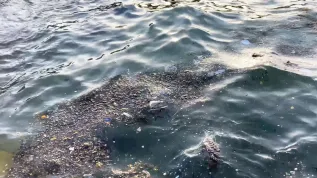Wrocław/ Scientist: Climate change is contributing to the spread of the black bee in Poland

30/07/2025 updated: 30/07/2025
2 minutes of reading
The purple carpenter bee, or black bee, until recently considered a likely extinct species in Poland, is spreading rapidly, primarily in the north of the country. Global warming and climate change are responsible for its expansion, pointed out Dr. Paweł Jarzembowski from the Institute of Biology, Wrocław University of Environmental and Life Sciences.
Adults of the purple woodlice moth reach up to 3.5 cm in length. The insect builds nests in dead wood, hence its Latin name , Xylocopa violacea , which comes from the Greek words "xylon" (wood) and "kopē" (to cut). The woodlice moth has a black body and wings with a navy-purple sheen.
Since 2004, it has been considered a "probably extinct" species in Poland, but today it is increasingly found, especially in the north of the country.
Dr. Paweł Jarzembowski from the Institute of Biology of the Wrocław University of Environmental and Life Sciences pointed out that global warming and climate change are mainly responsible for the return of this insect to Poland.
"The rising temperature favors the survival of thermophilic species and allows them to colonize areas where they were previously unable to survive. For over a decade, this phenomenon has resulted in the northward shift of the distribution boundaries of many species," explained Jarzembowski, quoted in a university press release sent to PAP.
The scientist also pointed to the natural migration of the woodlice and its spread related to human activity. "The insects migrate, for example, with the transport of timber, which, combined with a milder climate, allows them to survive and reproduce in new areas. The ecological flexibility of this species is also important. Although the woodlice are thermophilic, they can also inhabit environments transformed by humans. They use dead wood, wooden building walls, fences, and even crevices in walls, building nests there," Jarzembowski emphasized.
Scientists attribute the disappearance of this species in Poland at the beginning of the 21st century to the loss of suitable habitats, especially old, decaying trees, and the impact of agricultural intensification and the use of chemicals.
In Lower Silesia, the presence of the purple carpenter beetle was not recorded for 100 years, until 2015. Currently, it can be found in the southern and eastern parts of the voivodeship, including the Kłodzko Land, the Sudetes Foothills, the Wrocław Lowland, and along the Oder Valley. (PAP)
pdo/ zan/
The PAP Foundation permits free reprinting of articles from the Nauka w Polsce website, provided that you notify us by email once a month of your use of the website and cite the source of the article. On portals and websites, please include the linked address: Source: naukawpolsce.pl, and in journals, please include the annotation: Source: Nauka w Polsce website - naukawpolsce.pl. This permission does not apply to information in the "World" category or any photographs or video materials.
Before adding a comment, please read the Forum Rules of the Nauka w Polsce website.
Dear Reader, In accordance with the Regulation (EU) of the European Parliament and of the Council of 27 April 2016 on the protection of natural persons with regard to the processing of personal data and on the free movement of such data, and repealing Directive 95/46/EC (General Data Protection Regulation), we hereby inform you about the processing of your data. The data controller is the PAP Foundation, with its registered office in Warsaw at ul. Bracka 6/8, 00-502 Warsaw. This data is collected as part of your use of our services, including websites, services, and other functionalities provided by the PAP Foundation, primarily stored in cookies and other online identifiers installed on our websites by us and our trusted partners of the PAP Foundation. The collected data is used solely for the following purposes: • providing services electronically • detecting abuse of services
• statistical measurements and service improvement
The legal basis for data processing is the provision and improvement of services, as well as ensuring security, which constitutes the legitimate interest of the controller. Data may be shared, at the request of the controller, with entities authorized to obtain data under applicable law. Data subjects have the right to access, rectify, and erase data, and to restrict their processing. They may also withdraw consent to the processing of their personal data.
Please send all notifications regarding personal data protection to [email protected] or in writing to the PAP Foundation, ul. Bracka 6/8, 00-502 Warsaw, with the note "personal data protection"
More information about the processing of personal data and your rights can be found in the Privacy Policy. Learn more. I consent
naukawpolsce.pl







